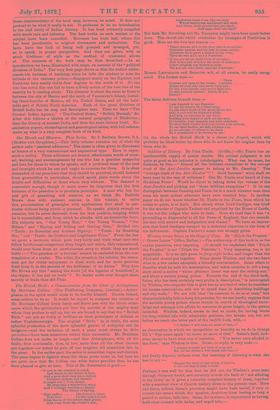Our Morals and Manners. First Series. By J. Baldwin Brown,
B.A. (Hodder and Stoughton.)—This little volume contains six of what the author calls "pastoral addresses." The name is often given to discourses or letters of a very conventional and unpractical type. Here it repre- sents a reality. These addresses are honest, affectionate words of coun- sel, warning, and encouragement by one who has a genuine sympathy and love for those to whom he speaks, and a profound sense of the care and foresight which he can and ought to exorcise for them. It is often demanded of our preachers that they should be practical, should descend from generalities to particulars, should speak plain words about the doubts and difficulties of those whom they address. The demand is reasonable enough, though it must never be forgotten that the first business of the preacher is to proclaim principles. A man who has the real gift of preaching will contrive, as we think Mr. Baldwin Brown does with eminent success in this volume, to unite this proclamation of principles with applications that shall be par- ticular without being trivial or personal. He speaks plainly enough on occasion, but he never descends from his true position, keeping which he is unassailable, and from which he attacks with an irresistible force. His subjects are, " Our Young Men," " Oar Young Women," "Oar Elders," and "Buying and Selling and Getting Gain," divided into " Trade : its Essential and Ancient Dignity; " "Trade : its Besetting Sin ; " and Trade; its Conduct and Legitimate Prize." From the last we quote a sentence which puts very fairly and truly what men who follow intellectual occupations often forget, and which, duly remembered, would save them from an unwholesome envy to which they are much liable :—" The question of ' a fortune' cannot be excluded from the con- templation of a trader. The artist, the preacher, the scholar, the states- man get far richer enjoyment in their work, and far more precious fruit from it, in the process of the fulfilment of its duties." Why does Mr. Brown say that "among the worst [of the legacies of feudalism] is the stigma it has put on trade"? No feudal noble ever thought more meanly of trade than did Plato.


































 Previous page
Previous page